Israel is blazing forward with a plan to protect sections of its 190-kilometer coastline, a measure experts say is crucial to maintain biodiversity and shield ecosystems from humanity. Rosh Hanikra, just south of the Lebanese border, is the centerpiece of this effort, providing what scientists believe can be a blueprint for rescuing seas ravaged by pollution, overfishing and climate change.
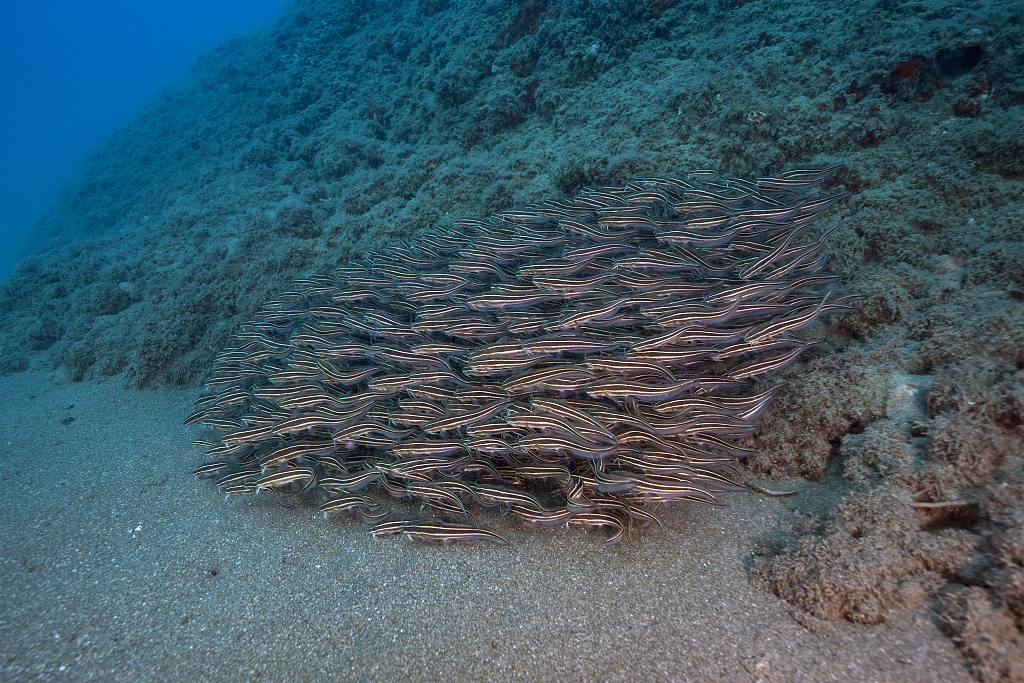
A flock of striped eel catfish observed with an underwater camera at the Eastern Mediterranean bays in Hatay, Türkiye, November 3, 2022. /CFP
A flock of striped eel catfish observed with an underwater camera at the Eastern Mediterranean bays in Hatay, Türkiye, November 3, 2022. /CFP
Climate change, invasive species and explosive human activity are threatening what remains of the eastern Mediterranean's severely impacted ecosystems. Scientists warn that without protection, remaining marine ecosystems will be devastated.
But there is a glimmer of hope. In recent years Israel has taken steps to better protect critical habitats along its Mediterranean coast, like the Rosh Hanikra Marine Reserve, and researchers say key species have bounced back even after just a few years of protection.
"If we won't maintain the resilience and the functionality of the ocean, it will collapse," said Ruth Yahel, a marine ecologist at Israel's Nature and Parks Authority. Conservationists say the best way to do that is creating zones where human impact is reduced.
Last month, an Associated Press team joined park rangers diving beneath the waves off Rosh Hanikra, which Yahel calls "the jewel in the crown" of Israel's marine protected areas, where commercial fishing, drilling and sewage runoff are prohibited. An underwater canyon and sloping hills - vestiges of the Mediterranean coastline submerged by rising seas at the end of the last Ice Age - provide oases for underwater life to gain a foothold.
Since 2019, Israel has increased these protected areas from roughly 0.3 percent of its coastal waters to around 4 percent. Another roughly 4.5 percent are earmarked for protection.
While those measures fall short of the international target of 10 percent by 2020, and broader global efforts to protect sea-life have faltered, it shows Israel has started taking the issue more seriously.
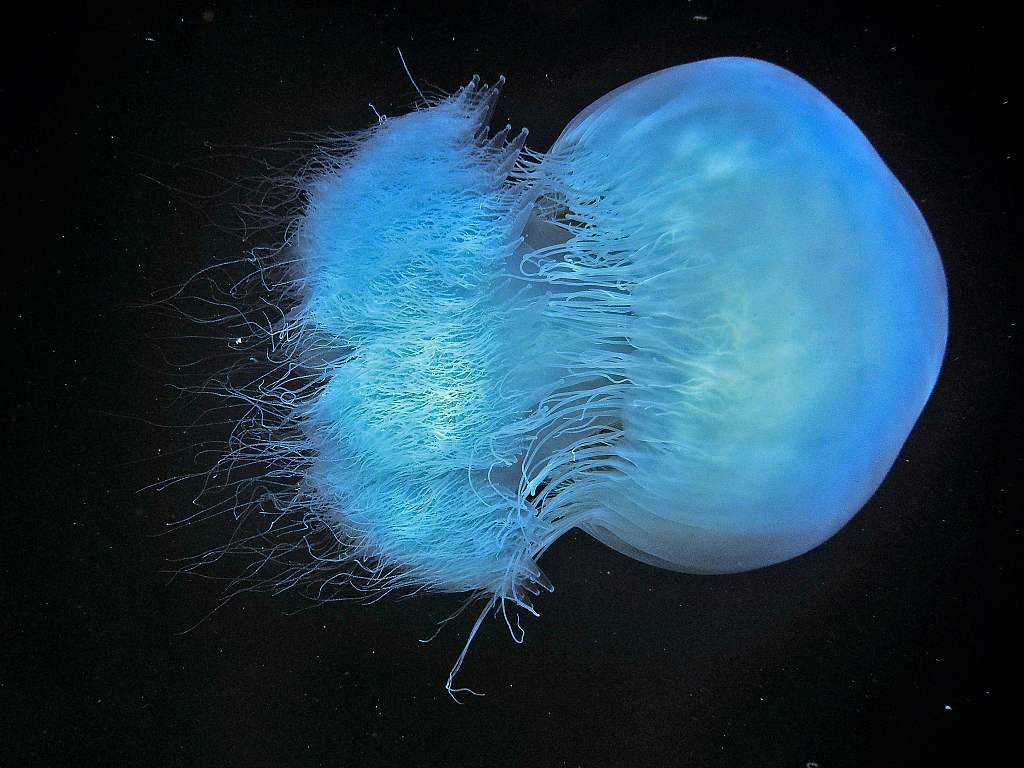
A jellyfish swims in the Mediterranean sea off the shore of Lebanon's northern coastal city of Tripoli, July 12, 2022. /CFP
A jellyfish swims in the Mediterranean sea off the shore of Lebanon's northern coastal city of Tripoli, July 12, 2022. /CFP
Last year, Israel signed on to U.S. President Joe Biden's 30 by 30 initiative of "conserving 30 percent of our lands and waters by 2030." Around 24 percent of Israel's land area is now designated as nature reserves, along with just over 2 percent of its total maritime territory, including its Exclusive Economic Zone stretching some 200 kilometers beyond its territorial waters. This summer the government declared a fishhook-shaped 450-square-kilometer protected area that's home to a deep-sea ecosystem several dozen miles off the coast of Tel Aviv outside its territorial waters.
These protected areas are not just lines on a map. Marine rangers patrol them along Israel's Mediterranean coastline and "protect an ecosystem that is supposed to be less disturbed by humanity," said Eyal Miller, one of the rangers.
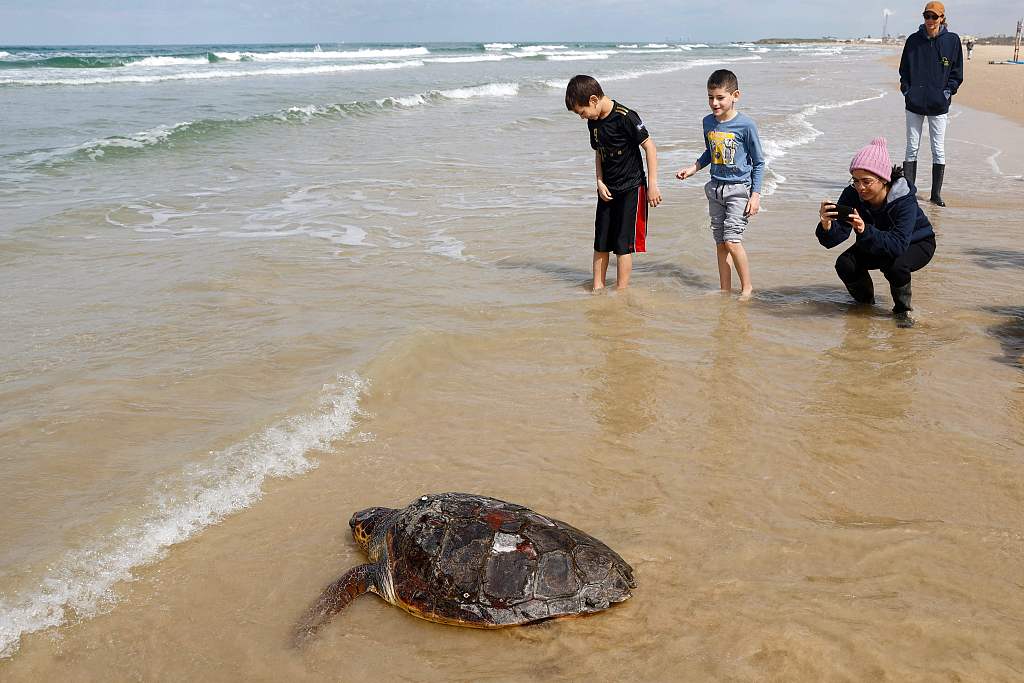
People watch a sea turtle that was treated for injuries by Veterinarians from the National Sea Turtle Rescue Center, as it finds its way into the Mediterranean after being released, off the coast of Mikhmoret, near the coastal city of Netanya, Israel, March 17, 2022. /CFP
People watch a sea turtle that was treated for injuries by Veterinarians from the National Sea Turtle Rescue Center, as it finds its way into the Mediterranean after being released, off the coast of Mikhmoret, near the coastal city of Netanya, Israel, March 17, 2022. /CFP
But that ambitious target faces major obstacles due to Israel's fast-growing population, limited available land, offshore gas exploitation, commercial fishing and shipping, and military use.
Tamar Zandberg, the country's outgoing environmental protection minister, said a main challenge is Israel's lack of an overarching government strategy concerning the Mediterranean.
"This is a very sensitive ecosystem that can very easily change from a solution to a problem if we don't conserve it," she said, expressing worry that environmental issues have become politicized and that Israel's incoming government may abandon them.
The Israeli government has faced criticism for its climate inaction. Dov Khenin, head of the Israel Climate Forum, recently summed up a 2021 state watchdog report on Israel's climate policies as "setting low targets and not meeting them." Just 8.2 percent of Israel's energy was produced from renewable resources in 2021, with the bulk of production coming from newly exploited natural gas reserves off its Mediterranean coastline, the Electricity Authority said.
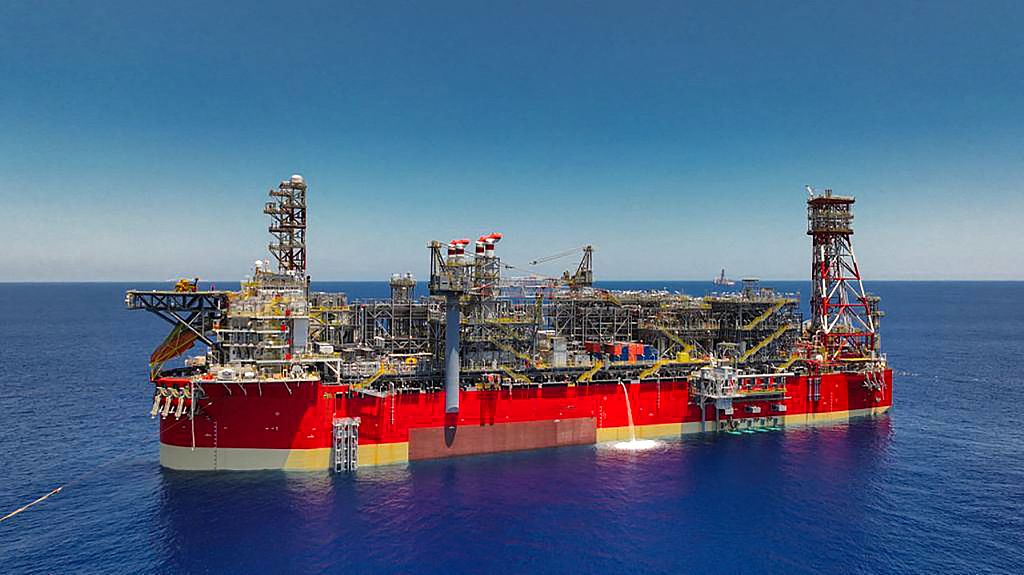
An Energean Floating production storage and offloading (FPSO) ship in the Karish field, an offshore gas field in the Mediterranean sea which is claimed by Israel and partly by Lebanon. Israel is preparing to activate an offshore gas field near its disputed maritime border with Lebanon, aiming to boost energy exports to Europe but risking further tensions with its northern neighbor, September 20, 2022. /AFP
An Energean Floating production storage and offloading (FPSO) ship in the Karish field, an offshore gas field in the Mediterranean sea which is claimed by Israel and partly by Lebanon. Israel is preparing to activate an offshore gas field near its disputed maritime border with Lebanon, aiming to boost energy exports to Europe but risking further tensions with its northern neighbor, September 20, 2022. /AFP
The Mideast as a whole is expected to be heavily affected as global temperatures rise, and the eastern Mediterranean is no exception. It is warming faster than most other bodies of water around the globe, putting its already heavily battered ecosystems at risk.
"We are like the canary in the coal mine for what might happen to the West and North as the climate keeps changing and water keeps warming," said Gil Rilov, marine biologist at Israel's Oceanographic and Limnological Research institute.
Israel's coastal waters are home to dozens of invasive species, from venomous lionfish and algae-marauding rabbitfish to enormous swarms of jellyfish, many of which originated in tropical waters and migrated to the Mediterranean through the Suez Canal.
"It's a complexity of conditions that the marine reserve mitigates by giving extra protection from human activity," said Yahel of the parks authority.
Yahel and her colleagues have conducted biomass surveys every other year since 2015 to gauge how effective the protected areas are. She says the zones have shown their effectiveness.
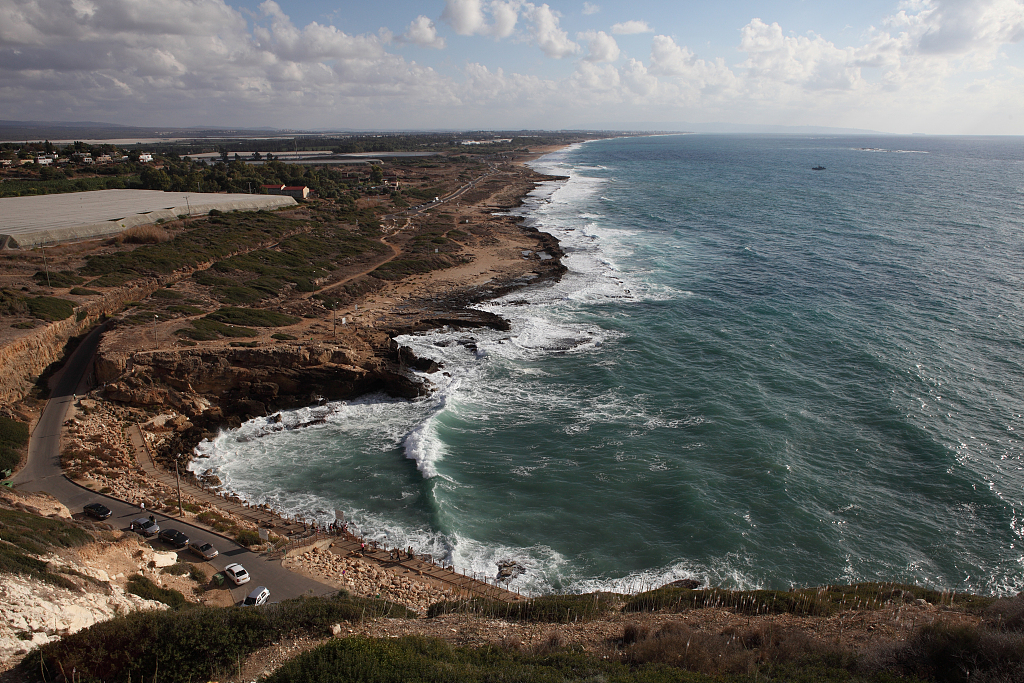
Rosh Hanikra, Mediterranean coast, Israel. /CFP
Rosh Hanikra, Mediterranean coast, Israel. /CFP
Algae, sponges and other invertebrates are all proliferating in the reserves, and commercial fish species like groupers have three times the biomass of those in unprotected waters. They're bigger, there are more of them, and as predators near the top of the food chain it's a sign of a healthy ecosystem, she said.
Not everyone is pleased by Israel's growing maritime protected areas, especially its dwindling number of commercial fishermen. Israel severely tightened regulations on its fishing industry in 2016, including a fishing ban during the spring spawning season and the use of bottom trawlers that destroy seafloor habitats.
"The truth is that we overfished our oceans," said Yahel, looking out over the waves in Rosh Hanikra. "If we won't allocate big chunks of area in order to protect it, we will lose the entire wonderful ecosystem of the sea."
(Cover image via CFP)
(If you want to contribute and have specific expertise, please contact us at nature@cgtn.com.)
Source(s): AP